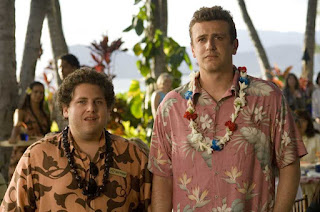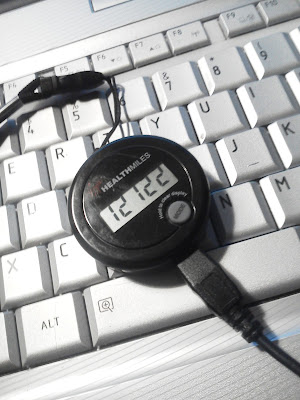Decaffed
Caffeine is arguably the most popular drug in this country. Over half of American adults drink coffee daily; another 30% drink it occasionally. The US -- with around 5% of the world population -- accounts for one-third of soda sales world wide. In the meantime, energy drinks have reached a somewhat unnerving level of popularity. It's so ingrained that ThinkGeek has an entire section devoted to caffeine paraphernalia. [Raise your hand if you'd like a coffee mug with a caffeine molecule drawn on it! For the record, it's hard to type with one hand raised.]
I have never considered myself dependent on caffeine. I've never been a gotta-have-a-cup-of-coffee-before-work person and while my Pepsi habits have been bad over the years, it's always been because I was craving ... Pepsi. And carbonation. However, there's a catch: while I didn't consider myself dependent, my body had some different ideas. I was drinking coffee pretty much daily. I didn't drink it for the pick-me-up, but that didn't mean there wasn't one thrown in there.
With the new year, I stepped back to take a look at my drinking habits. Clearly, the Pepsi thing needed to be brought under control. Moreover, though, I became curious about my general caffeine intake.
I have never considered myself dependent on caffeine. I've never been a gotta-have-a-cup-of-coffee-before-work person and while my Pepsi habits have been bad over the years, it's always been because I was craving ... Pepsi. And carbonation. However, there's a catch: while I didn't consider myself dependent, my body had some different ideas. I was drinking coffee pretty much daily. I didn't drink it for the pick-me-up, but that didn't mean there wasn't one thrown in there.
With the new year, I stepped back to take a look at my drinking habits. Clearly, the Pepsi thing needed to be brought under control. Moreover, though, I became curious about my general caffeine intake.
 |
| [No talk of caffeine research would be complete without a still shot of "NCIS"'s Abby. Who is kind of my hero.] |
There's not a lot of "aha" information on the stuff. Caffeine is a stimulant -- it provides temporary relief from drowsiness. Too much of it carries expected problems (insomnia, jitters, and so forth) but "too much" varies widely from person to person. Way too much can be toxic, but that generally requires you to take it in pill form.
Like I said -- not a lot of "ahas" out there.
What I found truly interesting were the differences in caffeine content from source to source. My beloved Pepsi Throwback can tells me it has 38 mg of caffeine. Naturally, that made me curious, and soon I found that a 16-ounce house coffee (that's a grande, for those keeping track) from Starbucks contains as much caffeine as nine -- nine -- cans of Pepsi. If there's that much difference just between those, what else don't I know?
Thanks to the Mayo Clinic, here's what I found:
 |
| [Yes. I graphed it. Just for you.] |
Tea, coffee and espresso, of course, have huge ranges of caffeine content. It all depends on how the bean or leaf was treated from beginning to end and at best there's an average. Still, it gives a person plenty to think about and comparisons can be made.
1. While espresso clearly has the most of the "normal" beverages (there's nothing normal about 5-Hour Energy), they're used in the lowest quantity. A medium (16-ounce) drink will have at most 3 shots of espresso, which works out to up to 225 mg of caffeine. In the meantime, a 16-ounce cup of coffee would have up to 400 mg of caffeine.
2. A full 12-cup pot of coffee could have up to 2400 mg, which is roughly five times the recommended maximum daily caffeine consumption of 500 mg. (Even at the low end, you're over 1000 mg.) While most would split that pot of coffee, there are some [Father...] who drink most of it themselves.
3. The darker the roast, the less the caffeine. Fun, huh?
3. The darker the roast, the less the caffeine. Fun, huh?
4. Mountain Dew, which has the most caffeine of the beverages without extra amperage, contains up to 55 mg. Coffee equivalent? 2 to 4 ounces, or a half a cup at most. (Which might explain the Dew habits of some of my former coworkers.)
5. Soda in general is below even the content of tea. Most of the energy boost you feel from soda really comes from the sugar content, which accounts for over 10% of the total beverage. (Put it this way -- in order to have similar sugar content in your coffee, you need nine teaspoons of sugar. If it's not in syrup form, odds are good it'll just sink to the bottom and get you in the last gulp.)
6. Energy drinks, while stronger than soda, don't really compare to coffee, particularly considering that a normally-found serving of coffee is double a standard serving of Red Bull or Monster. With them, it really does boil down to taste and availability. (I don't drink energy drinks, but I could be tempted if I were on the road and it was that or a cup of gas station coffee.)
7. A 2-ounce serving of dark chocolate (recommended is one ounce per day) gives you as much caffeine as a can of Mountain Dew. And about as much sugar.
I don't intend to demonize anything here. I love coffee. However, as someone who's into numbers and biology, I was curious as to what I was putting into my body -- my coffee habits were hitting scary levels before this year. In fact, before I looked up a single statistic, I had gone almost exclusively to decaffeinated coffee (which, in case you're curious, should contain no more than 3% of the caffeine of regular coffee). Somehow, I'm rather pleased with that decision now ... and I don't feel too bad about allowing an occasional Pepsi.
I asked a few people about their coffee-drinking habits, only to find that most folks I know fall into the "average" consumption of about 250 to 300 mg a day (with the exception of my full-gram dad). Now I'm curious -- where do the rest of you stand?
6. Energy drinks, while stronger than soda, don't really compare to coffee, particularly considering that a normally-found serving of coffee is double a standard serving of Red Bull or Monster. With them, it really does boil down to taste and availability. (I don't drink energy drinks, but I could be tempted if I were on the road and it was that or a cup of gas station coffee.)
7. A 2-ounce serving of dark chocolate (recommended is one ounce per day) gives you as much caffeine as a can of Mountain Dew. And about as much sugar.
I don't intend to demonize anything here. I love coffee. However, as someone who's into numbers and biology, I was curious as to what I was putting into my body -- my coffee habits were hitting scary levels before this year. In fact, before I looked up a single statistic, I had gone almost exclusively to decaffeinated coffee (which, in case you're curious, should contain no more than 3% of the caffeine of regular coffee). Somehow, I'm rather pleased with that decision now ... and I don't feel too bad about allowing an occasional Pepsi.
I asked a few people about their coffee-drinking habits, only to find that most folks I know fall into the "average" consumption of about 250 to 300 mg a day (with the exception of my full-gram dad). Now I'm curious -- where do the rest of you stand?



Comments
According to Starbucks (there is one way to conveniently located to my house), I'm getting up to 180 mg of caffeine in my morning bad habit. Of course, it would be more if Bully Blends was near me...
Since I don't drink soda or bad coffee, that's usually it for me, other than the occasional sweet tea.
I'm trying to reduce my caffeine habit for the purpose of cost rather than health. It's not worked very well, so far, though...